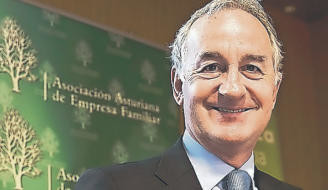Joan Francesc Corona presents the study “El gobierno de la empresa familiar” (The government of the family business)
Joan Francesc Corona, full academician of the Royal European Academy of Doctors-Barcelona 1914 (RAED) and general director of the Institute of Family Business, has presented the study “El gobierno de la empresa familiar” (The government of the family business), where he reviews and updates the recommendations of the “Guía de buen gobierno en la empresa familiar” (Guide to good governance in the family business), a pioneering work of reference that was developed more than a decade ago by the Institute of Family Business with the collaboration of the IESE business school and the Spanish Financial Studies Foundation, three institutions of international reference in business management studies.
Corona analyzes the different structures that occur in these societies and proposes specific management models for each one of them with a series of clear and concise objectives: to materialize the mission that from the point of view of the family has the company, to preserve the heritage, the values and culture of the entrepreneurial family, avoid family conflicts and, where appropriate, help to solve them, design an adequate patrimonial planning that makes compatible the financial needs of the family with those of the company, promote communication between family shareholders and boost the development of leadership in future generations.
 “The family government can be developed through formal or informal mechanisms, although the growth of the family and the company advise to introduce formal elements as soon as possible. The nature of these mechanisms depends, as well as that of administration, of the type of company, its size and the number of generations that have been incorporated into the project -the academician synthesizes-.To the extent that companies grow and new generations are succeeding, it’s recommended that family government be carried out through mechanisms such as the Family Assembly and the Family Council, and that materialize documentarily, for example, through family protocols. It’s very convenient, in addition, to discuss periodically the way in which these structures can be updated in response to the requirements of a system of government and relationships that change over time”.
“The family government can be developed through formal or informal mechanisms, although the growth of the family and the company advise to introduce formal elements as soon as possible. The nature of these mechanisms depends, as well as that of administration, of the type of company, its size and the number of generations that have been incorporated into the project -the academician synthesizes-.To the extent that companies grow and new generations are succeeding, it’s recommended that family government be carried out through mechanisms such as the Family Assembly and the Family Council, and that materialize documentarily, for example, through family protocols. It’s very convenient, in addition, to discuss periodically the way in which these structures can be updated in response to the requirements of a system of government and relationships that change over time”.
Corona analyzes one by one these governing bodies of the family business, establishes the model of relationship between the family and the company and defines another body that has been fundamental for the survival of the family business over several generations: the Familiar Protocol, a document that expressly contains the way in which the family wishes to respond to its corporate objectives. Clarifies the relationships between family and business and, above all, seeks to avoid family conflicts. Corona proposes a series of guidelines to elaborate and concludes with some fundamental advice that articulates in eight points.





